| Srl | Item |
| 1 |
ID:
090891
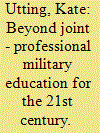

|
|
|
|
|
| Publication |
2009.
|
| Summary/Abstract |
As part of the realisation of the 1998 Strategic Defence Review's aim to create modern forces for the modern world' to meet the challenges of the twenty-first century the MOD embarked upon a cradle to grave review of armed services and civilian training and education that led to the 2001 Defence Training Review(DTR).This article examines the redesign of the 10 month mid-career Advance Command the Staff Course (ACSC) that resulted from the DTR recommendations.
|
|
|
|
|
|
|
|
|
|
|
|
|
|
|
|
| 2 |
ID:
177902
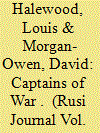

|
|
|
|
|
| Summary/Abstract |
This article examines the role of history in professional military education (PME) in light of the recent US Joint Chiefs of Staff’s guidance on achieving ‘intellectual overmatch’. Louis Halewood and David Morgan-Owen argue that a narrow approach to the past, underpinned by preconceived notions of ‘relevance’, undermines what ability history has to serve the aims of military education. History need not be ‘applied’ to make it valuable, as its study can provide a broader understanding of warfare. Only by treating history more seriously, and by meaningfully engaging with the legacies of Britain’s own military past, can the discipline contribute to modern PME.
|
|
|
|
|
|
|
|
|
|
|
|
|
|
|
|
| 3 |
ID:
157737


|
|
|
|
|
| Publication |
New Delhi, Pentagon Press, 2018.
|
| Description |
xii, 248p.hbk
|
| Standard Number |
9789386618344
|
|
|
|
|
|
|
|
|
|
|
|
Copies: C:2/I:0,R:0,Q:0
Circulation
| Accession# | Call# | Current Location | Status | Policy | Location |
| 059320 | 355.03/KAN 059320 | Main | On Shelf | General | |
| 059321 | 355.03/KAN 059321 | Main | On Shelf | General | |
|
|
|
|
| 4 |
ID:
160626
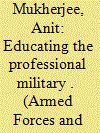

|
|
|
|
|
| Summary/Abstract |
This article analyzes the ways in which civil–military relations shape professional military education (PME). Its main argument is that military education benefits from a civil–military partnership. In doing so, the article examines the role of civil–military relations in shaping PME in India. While describing the evolution of military education in India, it analyzes its weaknesses and argues that this is primarily due to its model of civil–military relations, with a limited role for civilians. Theoretically, this argument challenges Samuel Huntington’s notion of “objective control”—which envisaged a strict separation between the civil and military domains. Conceptually, this article argues for a greater dialogue on military education among civilians, both policy makers and academics, and military officers and not to leave it to the military’s domain—as is currently the practice in most countries.
|
|
|
|
|
|
|
|
|
|
|
|
|
|
|
|
| 5 |
ID:
121911
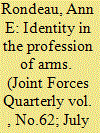

|
|
|
| 6 |
ID:
148967
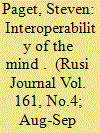

|
|
|
|
|
| Summary/Abstract |
The prevalence of coalition operations has ensured that interoperability between multinational forces is of overarching importance. Although historically interoperability was mainly seen as a matter of technology, Steven Paget argues that cultural interoperability is just as, if not more, significant. Cultural interoperability can be developed in many ways, but exchanges of international students and teachers during the process of professional military education has the potential to redress negative stereotypes, solidify strong existing bonds and enhance interoperability. As a considerable number of international exchange officers at professional military education institutions progress to the highest ranks of their own armed forces, the potential long-term benefits are vast.
|
|
|
|
|
|
|
|
|
|
|
|
|
|
|
|
| 7 |
ID:
121976
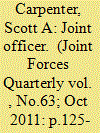

|
|
|
| 8 |
ID:
179359
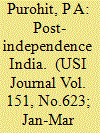

|
|
|
|
|
| Summary/Abstract |
The issue of jointmanship in the Indian Armed Forces assumed greater salience with Revolution in Military Affairs (RMA) and enhanced threats including collusive ones. Although unanimously agreed as a necessity, the perceptions about jointmanship vary across the Services. Analysis of jointmanship exhibited during wars, conflicts and major operations reveals a mixed bag — mainly divergent at the military strategic level yet reasonably good coherence, coordination and execution at the tactical level. To jointly outfight the enemy, the article infers the need of establishing sound Civil-Military Relations (CMR), realistic threat assessment, enhancing joint training, jointly developing capabilities, and rejuvenating existing mechanisms, especially at the strategic level. Importantly, it highlights the difference good leadership and a robust Professional Military Education (PME) makes in enhancing jointness, both in peace and war.
|
|
|
|
|
|
|
|
|
|
|
|
|
|
|
|
| 9 |
ID:
020395
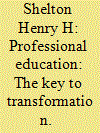

|
|
|
|
|
| Publication |
Autumn 2001.
|
| Description |
416
|
|
|
|
|
|
|
|
|
|
|
|
|
|
|
|
| 10 |
ID:
142360
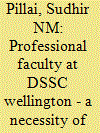

|
|
|
| 11 |
ID:
142467
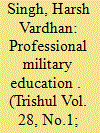

|
|
|
| 12 |
ID:
118148
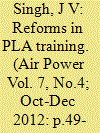

|
|
|
| 13 |
ID:
174973
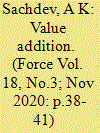

|
|
|
| 14 |
ID:
193060
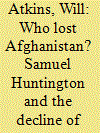

|
|
|
|
|
| Summary/Abstract |
Numerous reflections exist regarding who should be held accountable and what lessons should be learned from the military withdrawal and political collapse of Afghanistan. This essay argues that the failures in Afghanistan are second- and third-order effects of a failure of strategic thinking on behalf of civilian and military leadership alike. I argue that this failure of strategic thinking is caused, in part, by the overreliance on concepts of civil–military relations espoused by Samuel Huntington. These concepts have been inculcated by a professional military education system that has subsequently developed a generation of officers with an atrophied appreciation for the political aspects of war, and an inability to link operational prowess to the achievement of strategic objectives. This dilemma is aggravated by a similar overreliance on systematic thinking, which further obscures the linkages between the military and political aspects of strategy.
|
|
|
|
|
|
|
|
|
|
|
|
|
|
|
|
| 15 |
ID:
163576
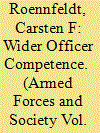

|
|
|
|
|
| Summary/Abstract |
Identifying and developing officer competence is important to a nation’s security and a crucial attribute of a legitimate military establishment. Critics have claimed that the U.S. officer corps favors a narrow conception of expertise that limits the armed forces’ utility as an instrument of policy. Drawing from the dialogue between Huntington and Janowitz, as well as Aristotle’s notion of practical wisdom, this article proposes a wider understanding of officer competence consisting of four distinct conceptual categories. The U.S. defense establishment favors “military skill” over other categories of competence. As a result, the officer corps is poorly prepared for 21st-century warfare. To remedy this situation, professional military education should cultivate military leaders that, in addition to military skill, have sociopolitical competence and practical wisdom. In this context, this article suggests strategies to develop such competencies that officers need to be able to achieve a diversity of national political goals.
|
|
|
|
|
|
|
|
|
|
|
|
|
|
|
|